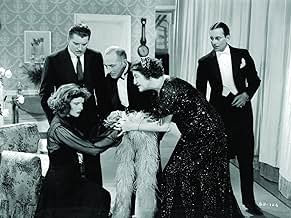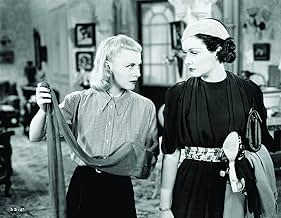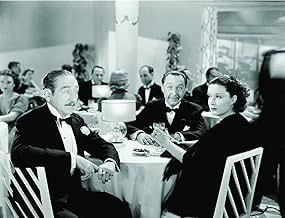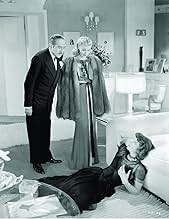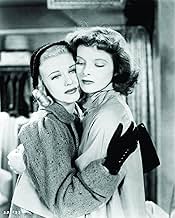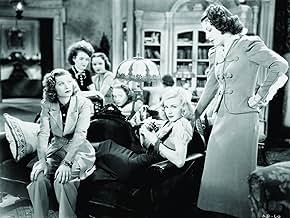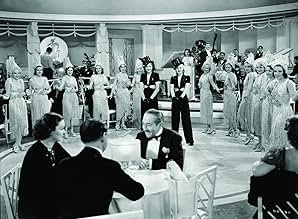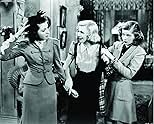VALUTAZIONE IMDb
7,7/10
9430
LA TUA VALUTAZIONE
Aggiungi una trama nella tua linguaA chronicle of the ambitions, dreams, and disappointments of aspiring actresses who all live in the same boarding house.A chronicle of the ambitions, dreams, and disappointments of aspiring actresses who all live in the same boarding house.A chronicle of the ambitions, dreams, and disappointments of aspiring actresses who all live in the same boarding house.
- Regia
- Sceneggiatura
- Star
- Candidato a 4 Oscar
- 5 vittorie e 5 candidature totali
Recensioni in evidenza
Thanks to the BBC this finally appears as a long-overdue TV showing in tribute to Kate Hepburn. A stunning cast includes Ginger Rogers, Eve Arden, Lucille Ball and Ann Miller (both looking impossibly young!), Constance Collier (one of the great old troupers), Andrea Leeds, Adolphe Menjou, and in the cast but not credited an hilarious performance from Franklin Pangborn as Menjou's butler, plus appearances from Jack Carson, Grady Sutton, Ralph Forbes. It is a classic film fan's joy even if the plot does creak along on a variation of the 'heiress who wants to act' theme.
Hepburn looks fabulous and that brittle voice was rarely used better than to deliver the sparkling script required. Great role for Ginger too (time off from dancing with Fred, this being around the middle of their legendary partnership). Love it. One to treasure.
Hepburn looks fabulous and that brittle voice was rarely used better than to deliver the sparkling script required. Great role for Ginger too (time off from dancing with Fred, this being around the middle of their legendary partnership). Love it. One to treasure.
Something very sinister happened to movies between 1937 and the 1950s that made this kind of film impossible to make. It's a terrific example of ensemble acting, with no one taking a back seat to anyone else. Ginger Rogers is absolutely amazing, especially after seeing some of the fluffy stuff she did with Astaire. It's hard to believe this is the same actress.
The dialogue zips along with lighting speed including some great laugh-out-loud one-liners. What a wonderful script! Very much like "Grand Hotel" in its structure and shockingly adult themes.
The relationships between all the women are so complex it's hard to believe it was actually made when it was. It makes men look very bad - at best we're imbeciles, at worst, Svengalis. And it has the same kind of uneasiness and disillusionment with the theater that "Sunset Boulevard" had with the movies. I wish there were more like it.
The dialogue zips along with lighting speed including some great laugh-out-loud one-liners. What a wonderful script! Very much like "Grand Hotel" in its structure and shockingly adult themes.
The relationships between all the women are so complex it's hard to believe it was actually made when it was. It makes men look very bad - at best we're imbeciles, at worst, Svengalis. And it has the same kind of uneasiness and disillusionment with the theater that "Sunset Boulevard" had with the movies. I wish there were more like it.
8sol-
A very well acted classic drama with great characters that interact realistically when together, it is also supported by some fine acting. Katharine Hepburn is very strong and natural, and Ginger Rogers matches her, playing a witty and almost cynical character very well. Gail Patrick is great too, yet Andrea Leeds was the only cast member to go on to receive an Academy Award nomination, however she is the best of the bunch, giving life to a frail and emotionally unstable aspiring actress. It is a bit overly talkative, and it has at least one too many subplots going on, however the film presents such an interesting insight into the lives of wannabee actresses that these points hardly matter. It is indeed a little difficult to distinguish each of the supporting characters as individuals, and perhaps they could done with further development, but yet this factor is very much like how all the aspiring actresses in the world are: indistinguishable, until you get to know them - and how actresses get ahead in the world is a lot of what this film is about. The final few minutes of the film could have been chopped out; otherwise this is good viewing all the way through.
Framed and shot as though a stage play which it was originally, but much changed for the film and with a stage play within the staged play, le tout ensemble in this witty farce delivers a virtual non-stop, wise-cracking, virtuoso performance. Timing is everything and in comedy, it's particularly so; and the director, Gregory La Cava who cut his teeth, in the silent era, as a director beginning in 1916 doesn't miss a beat with this one.
From a play by Edna Ferber (of Giant fame) and George S. Kaufman, the film tells the story of what happens to a group of aspiring actresses who happen to board at a place called the Floodlights Club in New York City, supposedly. Of course, there are minor players, as in all plays Lucille Ball, Eve Arden, Ann Miller and most of the men, the exception being Adolphe Menjou as a caricature (almost) of the Big Bad Producer of those days. The majors, Katharine Hepburn (as Terry), Ginger Rogers (Jean), Gail Patrick (Linda) and Andrea Leeds (Kay) form the core about which this story revolves.
Which, when all is said and done, is about the ascendancy of Terry as an actress and the decline of Kay as another: out with the old, in with the new, if you will. That would tend to make for a somewhat pedestrian story if it were simply that. Happily, what sets this apart from, say, the almost maudlin characterization by Hepburn in Morning Glory (1933) in a similar situation (for which, however, she did receive a Best Actress award in 1934), is, first, the scintillating dialog. Which means the viewer must really listen: it goes so quickly between characters that you'll miss the one-liners and sight gags if you take a chomp on a sandwich or sip of coffee, or whatever. So, be prepared.
What's left? Well, of course, the great acting by Hepburn, Rogers, Ball, Miller, Menjou, Arden, Patrick and Leeds, the latter getting a Best Supporting nomination for her somewhat overly tearful acting; so much so, she reminded me of Olivia de Havilland, in looks and style.
The direction, already mentioned, is in the hands of an old hand and it shows, explicitly. Add to that the camera work that included almost manic cuts up and down stairs, superb face-on tracking shots and perfect timing while up to a dozen people would mill about in the frame concurrently and with dialog. Confusing? Perhaps to some. Just concentrate on the majors.
What's more interesting for me, however, is the sub-text of this comedy. Made just before USA finally shook free of the Great Depression, as you listen, you'll hear many references to the hard times: at the Floodlights, everybody is down, but not out; rich and unscrupulous producers just want to use and abuse actresses; the women are all scraping for even the lowliest acting or dancing job at the meanest of wages; despondency and depression are endemic. Despite all of that, the women 'soldier' on, pushing themselves to their emotional and physical limits.
Women in the audience at that time must have felt the pull: don't deny your dreams of self-fulfillment, despite what chauvinistic clods of men might say and do, even powerful men. It's a stirring message, albeit idealistic, but it sets the tone for the larger section of a country that was about to engage in the world war which, in a very real sense, changed the role of women as never before. So, some may die, yes, but the show must go on...
There have been a number of introspective and self-referential films about the acting business, Morning Glory being the earliest I've seen. Others include A Star is Born (made and remade many times), All About Eve (1950) arguably the best, I think The Dresser (1983), The Player (1992), and others, but all heavy dramas. So, it's refreshing to find a gem that's prepared to treat the matter lightly, more rather than less.
A final thought: it must have been fun for the actors to act at being actors; it's even more fun to know that the director used much of the banter between the women off-camera to actually use in the film much to the playwrights' displeasure, so I understand.
Recommended for all.
From a play by Edna Ferber (of Giant fame) and George S. Kaufman, the film tells the story of what happens to a group of aspiring actresses who happen to board at a place called the Floodlights Club in New York City, supposedly. Of course, there are minor players, as in all plays Lucille Ball, Eve Arden, Ann Miller and most of the men, the exception being Adolphe Menjou as a caricature (almost) of the Big Bad Producer of those days. The majors, Katharine Hepburn (as Terry), Ginger Rogers (Jean), Gail Patrick (Linda) and Andrea Leeds (Kay) form the core about which this story revolves.
Which, when all is said and done, is about the ascendancy of Terry as an actress and the decline of Kay as another: out with the old, in with the new, if you will. That would tend to make for a somewhat pedestrian story if it were simply that. Happily, what sets this apart from, say, the almost maudlin characterization by Hepburn in Morning Glory (1933) in a similar situation (for which, however, she did receive a Best Actress award in 1934), is, first, the scintillating dialog. Which means the viewer must really listen: it goes so quickly between characters that you'll miss the one-liners and sight gags if you take a chomp on a sandwich or sip of coffee, or whatever. So, be prepared.
What's left? Well, of course, the great acting by Hepburn, Rogers, Ball, Miller, Menjou, Arden, Patrick and Leeds, the latter getting a Best Supporting nomination for her somewhat overly tearful acting; so much so, she reminded me of Olivia de Havilland, in looks and style.
The direction, already mentioned, is in the hands of an old hand and it shows, explicitly. Add to that the camera work that included almost manic cuts up and down stairs, superb face-on tracking shots and perfect timing while up to a dozen people would mill about in the frame concurrently and with dialog. Confusing? Perhaps to some. Just concentrate on the majors.
What's more interesting for me, however, is the sub-text of this comedy. Made just before USA finally shook free of the Great Depression, as you listen, you'll hear many references to the hard times: at the Floodlights, everybody is down, but not out; rich and unscrupulous producers just want to use and abuse actresses; the women are all scraping for even the lowliest acting or dancing job at the meanest of wages; despondency and depression are endemic. Despite all of that, the women 'soldier' on, pushing themselves to their emotional and physical limits.
Women in the audience at that time must have felt the pull: don't deny your dreams of self-fulfillment, despite what chauvinistic clods of men might say and do, even powerful men. It's a stirring message, albeit idealistic, but it sets the tone for the larger section of a country that was about to engage in the world war which, in a very real sense, changed the role of women as never before. So, some may die, yes, but the show must go on...
There have been a number of introspective and self-referential films about the acting business, Morning Glory being the earliest I've seen. Others include A Star is Born (made and remade many times), All About Eve (1950) arguably the best, I think The Dresser (1983), The Player (1992), and others, but all heavy dramas. So, it's refreshing to find a gem that's prepared to treat the matter lightly, more rather than less.
A final thought: it must have been fun for the actors to act at being actors; it's even more fun to know that the director used much of the banter between the women off-camera to actually use in the film much to the playwrights' displeasure, so I understand.
Recommended for all.
New York City. The Footlights Club is a theatrical boarding house where young women wait for the chance to make it big on Broadway. To deal with the disappointment & bitterness that can set in, they engage in wisecracks & gossip. Fiercely loyal to their friends, they can be wickedly spiteful to those that cross them. Always before them is their dream - to capture elusive success at the STAGE DOOR.
A wonderful film, fresh & sparkling, with great dialogue infusing its wit & drama. The rapid-fire cross talk is still a real treat for viewers - as is the chance to see several fine young actresses early in their careers.
The entire cast is excellent. Brash Katharine Hepburn is the new girl who quickly meets the `regulars': feisty Ginger Rogers, cynical Lucille Ball, wisecracker Eve Arden, lively Ann Miller, snobbish Gail Patrick & sweet Andrea Leeds. While the young ladies certainly get most of the attention, be sure not to overlook Constance Collier, terrific as Miss Luther the has-been actress. Growing old on bittersweet memories, she is a constant reminder to the others what, even with success, they still might become.
Adolphe Menjou gives his usual vivid performance as an immoral producer, while Samuel S. Hinds is good as Hepburn's father. Film mavens will enjoy spotting several familiar faces in uncredited roles: Jack Carson as a Seattle lumberman; Grady Sutton as a butcher's helper; Frank Reicher as a stage director; Franklin Pangborn, hilarious as a butler; and Ralph Forbes in the role of Hepburn's stage spouse.
A wonderful film, fresh & sparkling, with great dialogue infusing its wit & drama. The rapid-fire cross talk is still a real treat for viewers - as is the chance to see several fine young actresses early in their careers.
The entire cast is excellent. Brash Katharine Hepburn is the new girl who quickly meets the `regulars': feisty Ginger Rogers, cynical Lucille Ball, wisecracker Eve Arden, lively Ann Miller, snobbish Gail Patrick & sweet Andrea Leeds. While the young ladies certainly get most of the attention, be sure not to overlook Constance Collier, terrific as Miss Luther the has-been actress. Growing old on bittersweet memories, she is a constant reminder to the others what, even with success, they still might become.
Adolphe Menjou gives his usual vivid performance as an immoral producer, while Samuel S. Hinds is good as Hepburn's father. Film mavens will enjoy spotting several familiar faces in uncredited roles: Jack Carson as a Seattle lumberman; Grady Sutton as a butcher's helper; Frank Reicher as a stage director; Franklin Pangborn, hilarious as a butler; and Ralph Forbes in the role of Hepburn's stage spouse.
Lo sapevi?
- QuizWhen Katharine Hepburn delivered her climactic stage speech, Gregory La Cava reduced it to only ten lines and filmed it on a closed set. He later brought in the actors and the extras in the audience and had them react to the filmed speech. Many of them broke down.
- BlooperThe band at Club Grotto, where Jean and Annie perform a dance number, includes a female vocalist who can be seen singing in the background, but no vocals are heard on the soundtrack.
- Citazioni
Terry Randall: [delivering her opening speech in the play within the movie] The calla lilies are in bloom again. Such a strange flower, suitable to any occasion. I carried them on my wedding day and now I place them here in memory of something that has died.
- Versioni alternativeSPOILER: A shot of a man mowing the grass around Kay's grave is missing from some versions.
- ConnessioniEdited into Starring Katharine Hepburn (1981)
- Colonne sonorePut Your Heart Into Your Feet and Dance
(uncredited)
Written by Hal Borne and Mort Greene
Danced by Ginger Rogers and Ann Miller
I più visti
Accedi per valutare e creare un elenco di titoli salvati per ottenere consigli personalizzati
- How long is Stage Door?Powered by Alexa
Dettagli
- Data di uscita
- Paese di origine
- Lingua
- Celebre anche come
- Entre bastidores
- Luoghi delle riprese
- Azienda produttrice
- Vedi altri crediti dell’azienda su IMDbPro
Botteghino
- Budget
- 952.000 USD (previsto)
- Lordo in tutto il mondo
- 8835 USD
- Tempo di esecuzione1 ora 32 minuti
- Colore
- Proporzioni
- 1.37 : 1
Contribuisci a questa pagina
Suggerisci una modifica o aggiungi i contenuti mancanti



